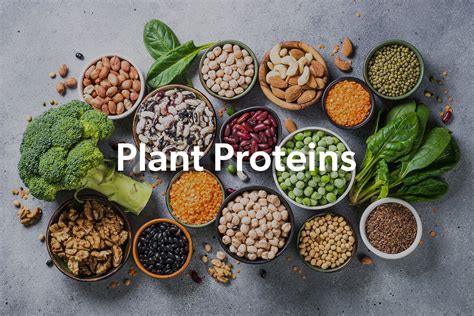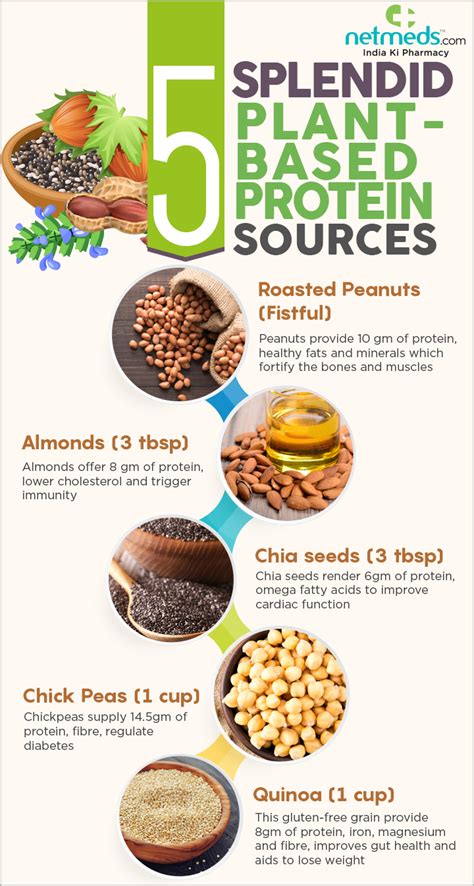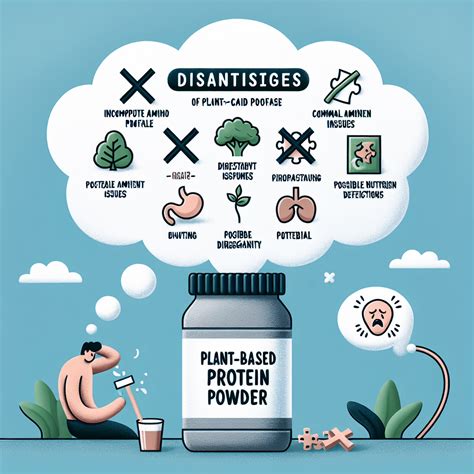Intro
Discover 5 plant-based proteins, including legumes, nuts, and seeds, for a healthy diet rich in vegan protein sources, plant-based nutrition, and meat alternatives.
The importance of protein in our diets cannot be overstated. It is a crucial component for building and repairing tissues, producing enzymes and hormones, and maintaining overall health. With the growing trend towards plant-based diets, it's essential to explore the various options available for those seeking to reduce their reliance on animal products. Plant-based proteins offer a wealth of benefits, from reducing the risk of chronic diseases to promoting environmental sustainability. In this article, we will delve into the world of plant-based proteins, exploring their benefits, types, and ways to incorporate them into your diet.
As the world's population continues to grow, the demand for protein sources is on the rise. Animal-based proteins, such as meat and dairy, have long been the primary sources of protein in many diets. However, the production of these products has significant environmental impacts, including deforestation, water pollution, and greenhouse gas emissions. Plant-based proteins, on the other hand, offer a more sustainable alternative, requiring less land, water, and energy to produce. Moreover, plant-based diets have been shown to reduce the risk of chronic diseases, such as heart disease, diabetes, and certain types of cancer.
The benefits of plant-based proteins extend beyond individual health and environmental sustainability. They also offer a more affordable and accessible option for many people, particularly in developing countries where animal-based proteins may be scarce or expensive. With the increasing availability of plant-based protein sources, it's easier than ever to incorporate them into your diet. Whether you're a seasoned vegetarian or vegan, or simply looking to reduce your meat intake, there are numerous plant-based protein options to explore.
Introduction to Plant-Based Proteins

Plant-based proteins are derived from a variety of sources, including legumes, grains, nuts, and seeds. These foods are rich in protein, fiber, and other essential nutrients, making them an excellent addition to a balanced diet. Some of the most common plant-based protein sources include beans, lentils, chickpeas, tofu, tempeh, and seitan. These foods can be easily incorporated into a variety of dishes, from soups and stews to salads and stir-fries.
Types of Plant-Based Proteins
Plant-based proteins can be broadly categorized into several types, each with its unique characteristics and nutritional profile. Legumes, such as beans and lentils, are some of the richest sources of plant-based protein. They are also high in fiber, vitamins, and minerals, making them an excellent choice for those seeking to improve their overall health. Grains, such as quinoa and brown rice, are another good source of plant-based protein, although they tend to be lower in protein than legumes.Benefits of Plant-Based Proteins

The benefits of plant-based proteins are numerous and well-documented. One of the primary advantages of plant-based proteins is their potential to reduce the risk of chronic diseases. Studies have shown that plant-based diets can lower blood pressure, improve blood lipid profiles, and reduce the risk of heart disease. Plant-based proteins are also rich in fiber, which can help promote digestive health and support healthy blood sugar levels.
Environmental Benefits of Plant-Based Proteins
In addition to their health benefits, plant-based proteins also offer a more sustainable alternative to animal-based proteins. The production of animal-based proteins requires significant amounts of land, water, and energy, resulting in deforestation, water pollution, and greenhouse gas emissions. Plant-based proteins, on the other hand, require less land, water, and energy to produce, making them a more environmentally friendly option.Top 5 Plant-Based Proteins

Here are five of the top plant-based proteins to consider incorporating into your diet:
- Lentils: Lentils are a type of legume that are rich in protein, fiber, and nutrients. They are also low in calories and rich in antioxidants, making them an excellent addition to soups, stews, and curries.
- Chickpeas: Chickpeas are another type of legume that are high in protein and fiber. They are also rich in vitamins and minerals, making them a nutritious addition to salads, stews, and stir-fries.
- Tofu: Tofu is a soy-based protein that is high in protein and low in calories. It is also rich in iron and calcium, making it an excellent option for those seeking to improve their overall health.
- Tempeh: Tempeh is a fermented soybean product that is high in protein and probiotics. It is also rich in vitamins and minerals, making it a nutritious addition to salads, stir-fries, and sandwiches.
- Seitan: Seitan is a wheat-based protein that is high in protein and low in calories. It is also rich in fiber and nutrients, making it an excellent option for those seeking to improve their overall health.
Ways to Incorporate Plant-Based Proteins into Your Diet
Incorporating plant-based proteins into your diet can be easy and delicious. Here are some tips to get you started: * Start with small amounts: If you're new to plant-based proteins, start with small amounts and gradually increase your intake. * Experiment with different types: Try different types of plant-based proteins, such as lentils, chickpeas, tofu, tempeh, and seitan. * Incorporate into familiar dishes: Add plant-based proteins to familiar dishes, such as soups, stews, salads, and stir-fries. * Try new recipes: Experiment with new recipes that feature plant-based proteins, such as curries, stir-fries, and salads.Challenges and Limitations of Plant-Based Proteins

While plant-based proteins offer numerous benefits, there are also some challenges and limitations to consider. One of the primary challenges is ensuring adequate protein intake, particularly for those who are new to plant-based diets. Additionally, some plant-based proteins can be low in certain nutrients, such as vitamin B12 and iron, which are found in higher amounts in animal-based proteins.
Addressing Nutritional Deficiencies
To address nutritional deficiencies, it's essential to eat a variety of plant-based proteins and include other nutrient-dense foods in your diet. Here are some tips: * Eat a variety of plant-based proteins: Include a variety of plant-based proteins in your diet, such as legumes, grains, nuts, and seeds. * Incorporate nutrient-dense foods: Add other nutrient-dense foods to your diet, such as fruits, vegetables, and whole grains. * Consider supplements: If you're concerned about nutritional deficiencies, consider taking supplements, such as vitamin B12 and iron.Conclusion and Future Directions

In conclusion, plant-based proteins offer a wealth of benefits, from reducing the risk of chronic diseases to promoting environmental sustainability. With the increasing availability of plant-based protein sources, it's easier than ever to incorporate them into your diet. Whether you're a seasoned vegetarian or vegan, or simply looking to reduce your meat intake, there are numerous plant-based protein options to explore. As we look to the future, it's essential to continue promoting the benefits of plant-based proteins and addressing the challenges and limitations associated with their production and consumption.
We invite you to share your thoughts and experiences with plant-based proteins in the comments section below. Have you incorporated plant-based proteins into your diet? What are your favorite plant-based protein sources? Share your recipes and tips with us, and let's work together to promote a healthier, more sustainable food system.
What are the benefits of plant-based proteins?
+Plant-based proteins offer numerous benefits, including reducing the risk of chronic diseases, promoting environmental sustainability, and providing a more affordable and accessible option for many people.
What are some common plant-based protein sources?
+Some common plant-based protein sources include legumes, such as beans and lentils, grains, such as quinoa and brown rice, and soy-based products, such as tofu and tempeh.
How can I ensure adequate protein intake on a plant-based diet?
+To ensure adequate protein intake on a plant-based diet, eat a variety of plant-based proteins, include other nutrient-dense foods in your diet, and consider taking supplements, such as vitamin B12 and iron.
